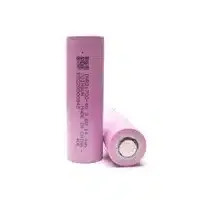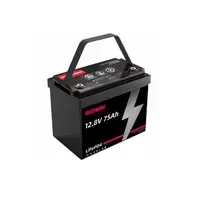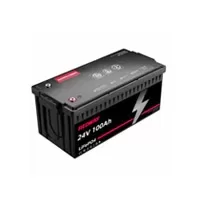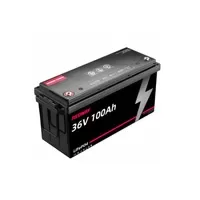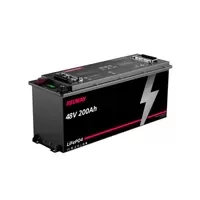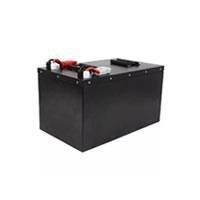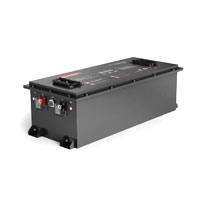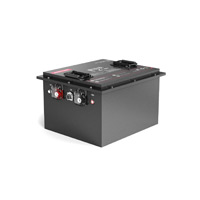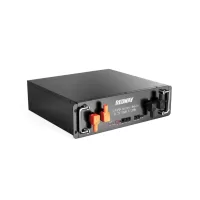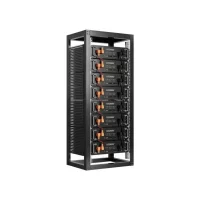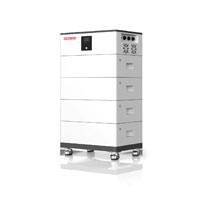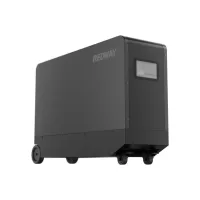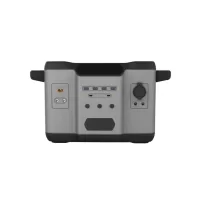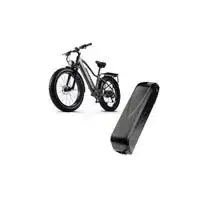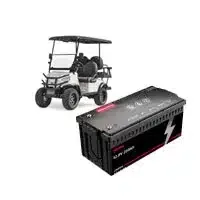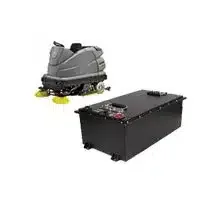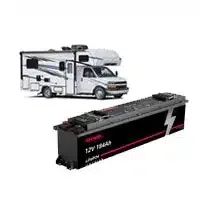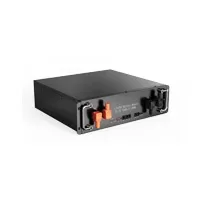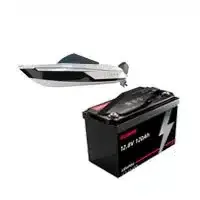Lithium batteries – the powerhouse of modern technology! These compact and efficient energy storage devices have revolutionized various industries, including transportation. And when it comes to scooters, lithium batteries are a game changer! Gone are the days of heavy lead-acid batteries weighing you down. With lithium batteries, you can experience enhanced performance, longer battery life, and a host of other benefits that make them an excellent choice for your beloved scooter. In this blog post, we’ll dive into the advantages of using lithium batteries, debunk common misconceptions surrounding them, discuss factors to consider when choosing a battery for your scooter, and provide some handy tips for taking care of your lithium battery. So let’s buckle up and explore why lithium batteries are truly electrifying for scooters!
Advantages of using lithium batteries in scooters
Advantages of Using Lithium Batteries in Scooters
Lithium batteries have become increasingly popular among scooter enthusiasts, and it’s not hard to see why. These innovative power sources offer a range of advantages that make them the top choice for many riders.
First and foremost, lithium batteries are known for their impressive energy density. This means they can store more energy in a smaller size compared to traditional lead-acid batteries. As a result, scooters equipped with lithium batteries tend to be lighter and more maneuverable, making them ideal for urban environments where agility is key.
Another major advantage of lithium batteries is their longer lifespan. While lead-acid batteries typically last around 1-2 years, lithium batteries can provide reliable performance for up to 5-7 years if properly maintained. This longevity translates into cost savings over time since you won’t need to replace your battery as frequently.
Additionally, lithium batteries boast faster charging times than their lead-acid counterparts. With quick charging capabilities, you’ll spend less time waiting around and more time enjoying the open road on your scooter. Plus, some models even come with features like regenerative braking that help recharge the battery while riding!
One common concern when it comes to lithium batteries is safety, but modern advancements have addressed this issue effectively. Most reputable manufacturers incorporate built-in protection systems that prevent overcharging or overheating, ensuring safe operation throughout your rides.
In terms of environmental impact, lithium batteries also take the spotlight here! They are much cleaner and greener than lead-acid alternatives since they don’t contain harmful substances like toxic lead or acid electrolyte solution. By choosing a scooter with a lithium battery, you’re contributing towards a sustainable future.
To fully benefit from using a lithium battery in your scooter:
1) Make sure to choose the right capacity based on your needs.
2) Opt for high-quality brands known for producing reliable products.
3) Follow proper maintenance guidelines, such as avoiding extreme temperatures and regularly checking the battery’s charge level.
In
Comparison with traditional lead-acid batteries
When it comes to choosing a battery for your scooter, one option that has gained popularity in recent years is the lithium battery. But how does it stack up against the traditional lead-acid batteries? Let’s take a closer look.
First and foremost, one of the biggest advantages of lithium batteries over lead-acid ones is their weight. Lithium batteries are significantly lighter, making them ideal for scooters where every pound matters. This means you can enjoy better handling and maneuverability on your scooter without sacrificing power or range.
Another key difference between these two types of batteries lies in their lifespan. While lead-acid batteries typically last around 2-3 years, lithium batteries have a much longer lifespan of up to 5-7 years. This not only translates into cost savings but also means less hassle when it comes to replacing your battery frequently.
In addition to longevity, lithium batteries also boast higher energy density compared to lead-acid ones. This means they can store more energy in a smaller package, resulting in increased performance and longer riding distances on a single charge.
Furthermore, lithium batteries offer faster charging times compared to their lead-acid counterparts. With shorter recharge times, you can spend less time waiting and more time enjoying rides on your scooter.
Let’s talk about maintenance. Traditional lead-acid batteries require regular topping up with distilled water and periodic equalization charges to ensure optimal performance. On the other hand, lithium batteries are virtually maintenance-free, saving you time and effort.
When comparing lithium batteries with traditional lead-acid ones for scooters’ use there are clear advantages in terms of weight reduction (improving handling), longer lifespan (saving money), higher energy density (increased range), faster charging times (less downtime) as well as minimal maintenance requirements.
Common misconceptions about lithium batteries
Common Misconceptions about Lithium Batteries
Lithium batteries have gained popularity in recent years due to their numerous advantages over traditional lead-acid batteries. However, there are still some common misconceptions that circulate about these powerful energy storage devices. Let’s debunk a few of these myths and set the record straight.
One misconception is that lithium batteries are unsafe and prone to exploding or catching fire. While it is true that any battery has the potential for thermal runaway in extreme conditions, lithium batteries are designed with safety features to minimize this risk. Manufacturers implement safeguards such as built-in protection circuits and thermal management systems to prevent overheating and overcharging.
Another myth is that lithium batteries have a short lifespan compared to lead-acid batteries. In reality, lithium batteries often outlast lead-acid counterparts by a significant margin. With proper care and maintenance, a high-quality lithium battery can provide many years of reliable service.
Some people mistakenly believe that all lithium batteries require extensive maintenance or special handling procedures. This couldn’t be further from the truth! Unlike lead-acid batteries which require regular topping up with distilled water, lithium batteries are virtually maintenance-free. They do not require any specific charging/discharging cycles or conditioning routines either.
There is also a misconception surrounding the environmental impact of using lithium-ion technology in scooters. It’s important to note that while manufacturing processes may have an ecological footprint, the overall environmental benefits of using rechargeable lithium-ion scooters far outweigh those associated with disposable alkaline options.
It’s essential to dispel these misconceptions about lithium scooter batteries so consumers can make informed decisions based on accurate information rather than hearsay or outdated beliefs.
Factors to consider when choosing a battery for your scooter
Factors to Consider When Choosing a Battery for Your Scooter
1. Battery Capacity: The capacity of the battery determines how long your scooter can run before needing a recharge. Consider factors such as your daily commute distance and frequency of use to determine the ideal battery capacity.
2. Voltage: Different scooters require different voltages, so it’s important to choose a battery with the correct voltage for your scooter model. Check the manufacturer’s specifications or consult an expert if you’re unsure.
3. Weight and Size: Keep in mind that batteries add weight to your scooter, which may affect its performance and maneuverability. Choose a battery that is lightweight yet provides sufficient power for your needs.
4. Charging Time: Some batteries take longer to charge than others. If you need quick turnaround times between rides, opt for a lithium battery with faster charging capabilities.
5. Lifespan and Durability: Lithium batteries generally have a longer lifespan compared to lead-acid batteries, but it’s still essential to choose one from reputable brands known for their durability and reliability.
6. Price: While lithium batteries tend to be more expensive upfront, they often offer better value in terms of performance and longevity compared to lead-acid alternatives in the long run.
7. Maintenance Requirements: Consider how much effort you are willing to put into maintaining your scooter’s battery. Lithium batteries typically require less maintenance than lead-acid options but may still need occasional checks and proper storage during extended periods of non-use.
8.
Environmental Impact:The environmental impact of different types of batteries should also be taken into account when choosing one for your electric scooter.
Consider opting for lithium-ion technology due them being more environmentally friendly compared traditional lead-acid counterparts.
Remember these factors while selecting a new battery will help ensure that you make an informed decision tailored specifically towards meeting both short-term requirements
Tips for taking care of your lithium battery
Taking care of your lithium battery is crucial to ensure its longevity and optimal performance. Here are some tips to help you maintain your scooter’s lithium battery:
1. Charge it properly: Always use the charger provided by the manufacturer and follow the recommended charging instructions. Overcharging or undercharging can damage the battery.
2. Avoid extreme temperatures: Lithium batteries perform best in moderate temperatures, so try to avoid exposing them to extreme heat or cold. This can affect their overall lifespan and performance.
3. Store it correctly: If you’re not using your scooter for an extended period, make sure to store the lithium battery in a cool and dry place with a charge level between 30-50%. This will prevent over-discharge or overcharging during storage.
4. Keep it clean: Regularly inspect your battery for any dirt, debris, or corrosion on the terminals. Clean them gently with a damp cloth if necessary, but be careful not to let water enter any openings.
5. Handle with care: When removing or installing your lithium battery, handle it carefully and avoid dropping it as this may cause damage that could affect its functionality.
6. Regular maintenance checks: It’s essential to periodically check the voltage levels of your lithium battery using a multimeter or consult a professional technician who can assess its health accurately.
By following these tips, you can maximize the lifespan of your scooter’s lithium battery and enjoy reliable performance every time you hit the road!
Conclusion: Making an informed decision for your scooter’s battery needs
Making an informed decision for your scooter’s battery needs is crucial to ensure optimal performance and longevity. While both lithium batteries and traditional lead-acid batteries have their benefits, it’s clear that lithium batteries offer numerous advantages that make them a great choice for scooters.
Lithium batteries are lightweight, compact, and provide higher energy density compared to lead-acid batteries. This means you can enjoy longer rides without worrying about the battery running out of power. Additionally, lithium batteries have a longer lifespan and require less maintenance compared to lead-acid batteries.
One common misconception about lithium batteries is their cost. While they may have a higher upfront cost, they prove to be more cost-effective in the long run due to their extended lifespan and lower maintenance requirements. Moreover, advancements in technology continue to drive down the price of lithium batteries.
When choosing a battery for your scooter, consider factors such as voltage compatibility with your scooter’s motor, capacity (measured in ampere-hours or Ah), size and weight constraints, charging time, and safety features like overcharge protection.
To take care of your lithium battery properly:
1. Avoid fully discharging the battery: It is recommended to recharge when the charge level reaches around 20-30%. Frequent full discharges can reduce the overall lifespan of the battery.
2. Store at moderate temperatures: Extreme heat or cold can affect the efficiency of lithium batteries.
3. Use compatible chargers: Charging at too high or too low currents can damage the cells within the battery.
4. Regularly inspect connections: Ensure all wires are securely connected and free from corrosion or damage.
5. Protect against physical damage: Invest in protective cases or covers if necessary.
In conclusion,
Lithium batteries offer significant advantages over traditional lead-acid ones when it comes to powering scooters efficiently. They are lighter, deliver higher energy density levels while having an extended lifespan requiring less maintenance than their counterparts.
By considering important factors like voltage compatibility, capacity, size, and safety features when choosing

